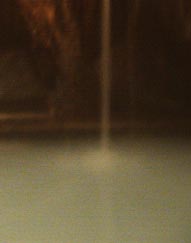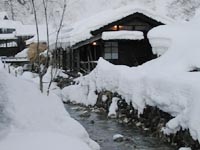 Tsurunoyu is a mountain hot springs resort where people get wet the way rural Japanese folks have for three hundred years.
Tsurunoyu is a mountain hot springs resort where people get wet the way rural Japanese folks have for three hundred years.
People roll in here, take off their clothes and get into the baths. It's the same routine you might find at any hot bath anywhere in the world, except here you're part of a long ritual of bathing. You can feel the buttocks of many departed bathers shifting in the tub alongside yours.
This is an hour by car and bus from a train station three and a half hours from 東京 Tokyo. Mobile phones don't work, and I haven't been able to find an Internet connection. They do have a payphone, however, and a few vending machines. Otherwise, the rest is largely 古い日本.
The buildings are certainly old Japan; wooden, dark, with sliding doors and tatami mat floors. Tree branches or cut bamboo pipe water from spring to bath.
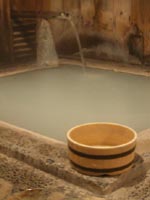 Indoors, the baths are simple; square wooden tubs set in plain wooden rooms. There are quite a number of these; for ladies and men individually and together both. Small, seating no more than four people who know each other.
Indoors, the baths are simple; square wooden tubs set in plain wooden rooms. There are quite a number of these; for ladies and men individually and together both. Small, seating no more than four people who know each other.
The center of Tsurunoyu is a large outdoor public bath, a large waist-deep puddle of sulfur set in rocks, lit at night with kerosene lamps. From here you can see the buildings, and up the tall sides of the steep mountain behind Tsurunoyu.
The Big Pool, by Day:
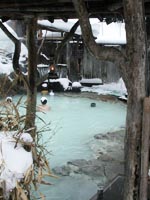
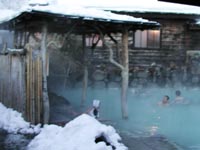
The Big Pool, by Night:
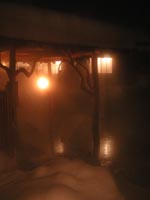
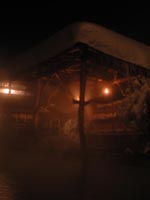
Tsurunoyu was recommended to me by Robert Neff at the FCCJ, who has probably soaked his skin in more onsens than most aged Japanese people. He's made a point of travelling throughout Japan to try the different flavours of hot springs. His tastes tend towards the traditional, and this place fits that description quite well. He's written a book on the subject, called Japan's Hidden HotSprings.
自炊 - じすい - Jisui
Part of that tradition is a 自炊 - じすい Jisui, a self-cooking unit, a place where you can live at an onsen for cheap, since you bring and prepare your own food. This idea of living at a hot springs was first mentioned by a ちはら-かじつか-さん, who observed that if I was excited to live in rural 秋田 Akita, I might like to try living in a 湯治場 - "toujiba" which is where farmers can stay at an onsen during the winter. He said the communal living was like an "old-style chat room." But like farmers in Japan, Toujiba, Jisuibu are both pretty scarce these days. Tsurunoyu was one of three onsen near 田沢湖 lake Tozawa that had a jisui - there are dozens more with just plain rooms.
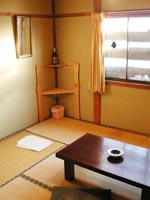 The accommodations are roughly 4500 yen a day; including a little extra to rent a futon and a robe. For that much, I get a room, and access to a kitchen of sorts. And full access to all the baths!
The accommodations are roughly 4500 yen a day; including a little extra to rent a futon and a robe. For that much, I get a room, and access to a kitchen of sorts. And full access to all the baths!
The room is six 畳 tatami mats (about the same as my マンシオン mansion in 鴬谷 Uguisudani). There's a small low table. Futons in a closet. A small shelf. A mirror. An overhead light, a single power outlet, and an electric heater. An emergency flashlight. A window; on the bottom floor, I'm looking up through wood slats just peeking another roof over a tall snow drift. A sliding door between me and the world; no lock provided. I live at the far end of a long hall; above are hotel rooms, on this floor are maintenance rooms. My neighbors are some Tsurunoyu staff members themselves, some of whom share the kitchen with me.
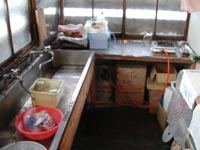 The kitchen is a drafty uninsulated room at the end of the hall. The fridge are buckets of water continually recharged from the nearby streams. There's no hot running water; not a problem unless you plan to have your hands under icy water for more than three seconds. The hotel will sell me a bowl of cooked rice for 150 yen.
The kitchen is a drafty uninsulated room at the end of the hall. The fridge are buckets of water continually recharged from the nearby streams. There's no hot running water; not a problem unless you plan to have your hands under icy water for more than three seconds. The hotel will sell me a bowl of cooked rice for 150 yen.
I discovered what kind of food I was missing one night when I met a few gentlemen.

I purposefully came in the winter; I wanted to see Japan's snow country in the thick of hearty weather. I was not disappointed at Tsurunoyu; each morning and during the day I would often look up from my writing on my computer to see thick flakes coming down. I would finish up and rush to the baths to have a cold head and hot flanks. Yum! The steam rising off the water of the outdoor pool mystifies the mountains beyond. Snow flakes cool my exposed parts. At night the kerosene lamps cast a pale glow on old snow. Yosh!
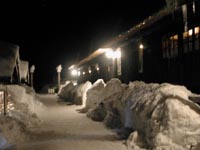
The arrangements for my stay at Tsurunoyu were largely the work of 綾子 Ayako, who spoke very polite Tokyo Japanese with many different Akita 温泉 Onsen who were not always excited to have an uninformed 外人 gaijin come stay with them. Tsurunoyu was accommodating but they didn't have any good answers to any questions about Internet connections.
I don't think you could comfortably stay here without speaking some Japanese. You could get here, but you'd learn some of the language on the way. And being here would not be comfortable without at least a few words to share.
January 2002, I stayed here for two weeks, and I kept records: Week One and Week Two.
Tsurunoyu Links (January 2002)
What seems to be the official site Tsurunoyu.com; even if you can't read Japanese, click deep for pictures.
Another page about Tsurunoyu, with photos.
| 
